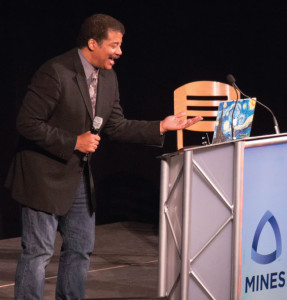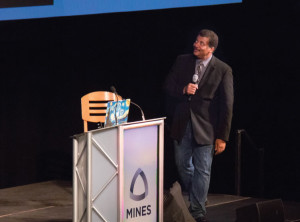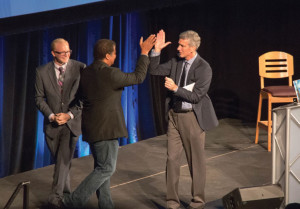
Prior to his sold out show in Lockridge Arena, Dr. Neil deGrasse Tyson shared a bit about his trip to Mines, opinion on STEM degrees and related issues, and spirit animal of choice.
Q: What was it that drew you to presenting at the Colorado School of Mines?
A: Basically, if I had my choice, I would never present anywhere to anyone. I would stay home and play with my kids and go on a play date with my wife. So now, requests come in. I get about 200 requests a month to make appearances and that’s impossible. If I did any fraction of that, that’s all I would be doing and then I wouldn’t have any time to do what it is that attracted them to invite me to talk in the first place. So it’s a self-limiting problem. There’s a severe triage that unfolds on those 200 requests and some of it relates to how far away is it, who is the audience, can they benefit from it? And all of this comes together – and sprinkled in there, there are several occasions where I’m communicating with people who I know will shape the future of science literacy in this country by their inventions, by their entrepreneurship, by their level to which they embrace STEM fields, and Colorado School of Mines is right there in the middle of that. So given that the invitations come, that’s kind of how the triage operates. But I didn’t start my day by saying, “I’ve got to talk to CSM!” No, that’s not how my day started. I started my day saying, “I want to stay home.” But when invited and when the triage is done, then I give my all for whatever the invitation is.
Q: What do you hope that they are going to take away from your lecture?
A: So the topic chosen for this audience is called “Astronomy Bizarre.” It’s all the weird stuff – the weird objects, weird phenomenon, weird ideas that drive our understanding of the universe. I’m guessing, given the legacy of the school, that there’s less aerospace here compared with how other engineering schools might be. So you might have less exposure to cool cosmic things than other places might. So I’m bringing that to you… just to show you what other folks are thinking about out there.
I count myself as a cardcarrying member of the Geeka- verse. So part of it will just be to celebrate what it is to have this kind of fluency. And so often, probably when you were in high school, you were kind of weird to other people, I’m guessing. If not actually, but possibly figuratively slammed into lockers. In my day, you’d get a wedgie.
I don’t know if they still do that. You know about the atomic wedgie? Well, it’s a wedgie… that you pull up so high that it can fit over their head. In my day, that’s basically what happened to the geeks. That all changed – that’s how old I am – when computers started becoming an important part of people’s lives.
First in the workplace, then in the home. And then the people who would otherwise give the nerds the wedgies, realized that they need them to help them figure out the computer…. and there was an emergent class of people who were gaining wealth because the whole world wanted computers and that became the geek class. So now the patron saint of geeks is Bill Gates, and he’s the richest man in the world. So now you don’t find geeks abused in today’s school environments. If it happens at all, it’ s a fraction of what happened in my day, because we were still just a weird bunch. Anyways, what am I saying? I’m saying I look forward to such an opportunity so we can all sort of celebrate being scientifically literate together.
Q: Speaking of weird science stuff, what’s your take on Mars?
A: I think it’s cool. We kind of always knew that it was going to be that, but it’s nice to get some hard evidence for it.

Q: What would be one piece of advice for the college students now pursuing STEM that used to be the geeks?
A: [Students] want to take an easy class, so that they can get a high grade so that their GPA looks good. Now, what that means is that we have created an educational system that tells us that your GPA is the measure of who you are. Not, “What did you learn?”
No one asks that. They ask, “What is your GPA?” And this question has such focus while you’re in school. Yet…it is the most irrelevant datum that exists in the rest of your life. Yet somehow we’re all convinced that it’s everything while we’re in school. To me, that’s an abomination. It’s a tragedy. Because the most successful people and most influential people in society – positively influential – like Bill Gates, Steve Jobs, Michael Dell, Elon Musk, half of them are college drop outs. Is your question to them, “Did you get straight A’s in school?” If it is, their answer is, “No.” There’s something else that goes on in the mind of an entrepreneurial, creative person who has the energy for change that does not derive from climbing over yourself to get a high GPA. So my advice would be, you should take the classes you want, no matter how hard they are, and forget about your GPA. Because at the end of the day, what’s going to matter is how much you have learned.
So if you take a hard class, you’re ascending a ladder, and every rung of that ladder that you ascend for having done something hard, there are fewer other people around you who can do what you can do. And by the time you ascend to the top of that ladder, maybe there’s no one there, and therefore everybody has to beat a path to your door because you know how to solve a problem that no one else can.
At the end of the day, that’s what drives who and what you become as an adult. Not your GPA. Never your GPA. I don’t want to say that I’m anti-GPA. I’m against how much emphasis we place on your GPA. So my advice is take the hardest classes you can, and if you get a B, or maybe even a C, don’t worry about it. At the end, you’ll be a deeper thinker for having done so.
Q: What is your favorite movie?
A: Matrix. One, of course. Second favorite is Contact.
Q: What is your sprit animal?
A: I’ve never thought about that. But if I had to choose, probably the Galapagos tortoise. I bet the Galapagos tortoise spends a lot of time thinking deep thoughts. Because what the hell else are they doing? They look like the wisest creatures in the land. And maybe they’ve invented calculus, they just don’t have opposable thumbs to write it down. But it’s in their head.
Q: Batman or Iron Man?
A: Those are the right ones to pit against one another, because they’re both human. I think Iron Man could wipe his butt with Batman, because Iron Man is himself the engineer, and he solves the problems, whereas Batman needs his engineering company to invent his things. They both are the heads of big companies, but definitely Iron Man. He would vaporize and melt from the heat generated from the energy in his chest so that’s an issue that’s not really resolved. You can’t contain that much energy, and have it not affect the temperature of its environment. But we’ll let it slide.
Q: You once said that you think a person’s mind should be blown once a day. How has your mind been blown recently?
A: You actually have a finite number of days you’ll be alive, a finite number of sunrises and sunsets and what are you doing each day? I think every day I want to learn something that I didn’t know the day before, and it’s better if what I learn blows my mind because that opens your mind up for other things that might also blow your mind in a different way. You won’t be closed off to it.
It’s been said…that there’s nothing harder for the human mind to embrace than the prospect of a new idea. We reach for comfort in ideas that we retread…I’m here to tell you that for every day you hear the same thing, you missed a day when you could have heard something different.
I’ll end on this point, I was asked by the New York Times to comment on what books were on my shelves. So they take writers and they say, “What do you read? We’re reading your book, but what do you read?” So I gave some books that work their way close to my bedstand, and they said, “Are there any books that people might be surprised that you own?”
I said, “I don’t know. I have whole shelves on pseudoscience and religion and Islam.”
They said, “Wow!” And I said, “Why would you be surprised?”
I realized in that moment that when you tell people what books you read, they expect all the books you list to be exactly what you want to keep telling yourself.
Think about that. Your books reinforce whatever are your thoughts, biases, perspectives, dogmas, you keep buying books that feed that. This is what people do when they search Google. They search what they want to be true and they find other websites saying, “Yeah, okay, this must really be it. This is it, this is it, this is it.” It’s like people who don’t like vaccines. They say, “I don’t like vaccines,” and in come all the websites and it feeds their I don’t like vaccines thing. Doesn’t matter if it’s true, it just feeds it. So part of the, “I want my mind blown every day,” thing, I read stuff that very different kinds of people write and think about it and that just opens you up. The point of education is not to fill your head with information. The point of education is to take an empty mind and turn it into an open mind.

Following the interview, Dr. Tyson delivered an enticing lecture that had the audience laughing, booing, and pondering the intricacies of the universe. The lecture, titled “Astronomy Bizarre,” was both informational and inspiring, with witty jokes sprinkled throughout. Topics included everything from science in movies to recent space-related discoveries. “What do you get when you cross an elephant and a banana? Well, if they’re vectors, you get elephant-banana-sine (theta),” Dr. Tyson joked.
Dr. Tyson highlighted the significance of the recent discovery of water on Mars, a feat that many scientists had been not only hoping for, but expecting as well. The running water was discovered in the wake of locating salt deposit changes in deep, periodically changing valleys on the planet.
Considering the remainder of the universe, Dr. Tyson also described possible life-inhabiting zones within earth’s galaxy.
With sheets of ice dozens of miles thick, Jupiter’s moon Europa does not exactly sound like a human paradise. However, Dr. Tyson explained that the moon could provide home to extremophiles, or organisms capable of surviving in the coldest or hottest of temperatures.
“It’s not the leaders who need to have more science literacy,” explained Dr. Tyson. “[The voters] need to be in an informed state to make sound decisions [for their country].” To address this important issue, Dr. Tyson explained the mindbending ideas of black holes, white holes, and wormholes, all of which act as tears in both space and time.
Amazingly, the renowned astrophysicist managed to put these complex concepts in terms comprehensible to even the average person, illustrating the importance of space exploration and inspiring each member of the audience to consider the possibilities beyond this world.


'Tyson Delivers “Bizarre” Lecture' has 1 comment
October 12, 2015 @ 7:27 am dave pacific
Perhaps an amplification of one reason CSM made the cut to be the wise Dr. Tyson’s highly-selective venue choice:
In 2005, at a conference at the National Academy of Sciences, Tyson responded to a question about whether genetic differences might keep women from working as scientists. He said that his goal to become an astrophysicist was, “…hands down the path of most resistance through the forces … of society.” He continued: “My life experience tells me, when you don’t find blacks in the sciences, when you don’t find women in the sciences, I know these forces are real and I had to survive them in order to get where I am today. So before we start talking about genetic differences, you gotta come up with a system where there’s equal opportunity. Then we can start having that conversation.”
https://en.wikipedia.org/wiki/Neil_deGrasse_Tyson
btw this is an excellent interview!